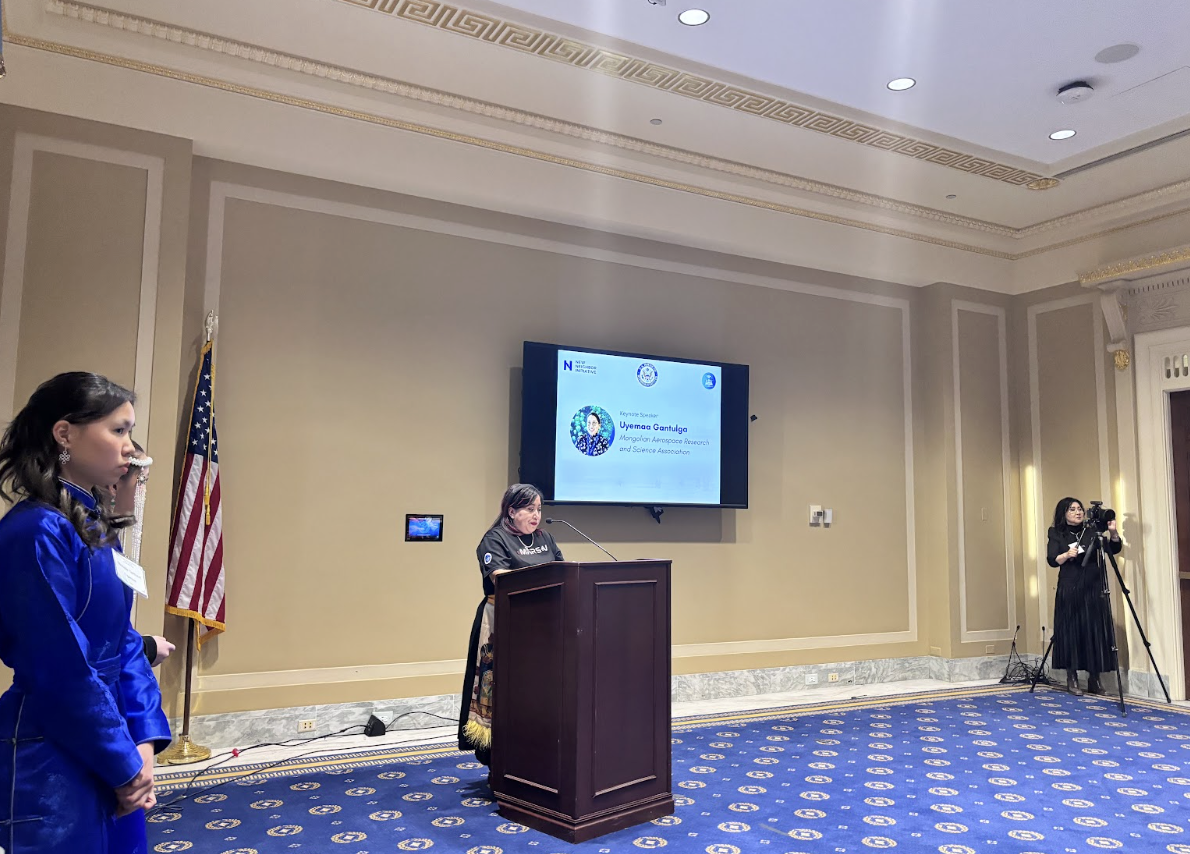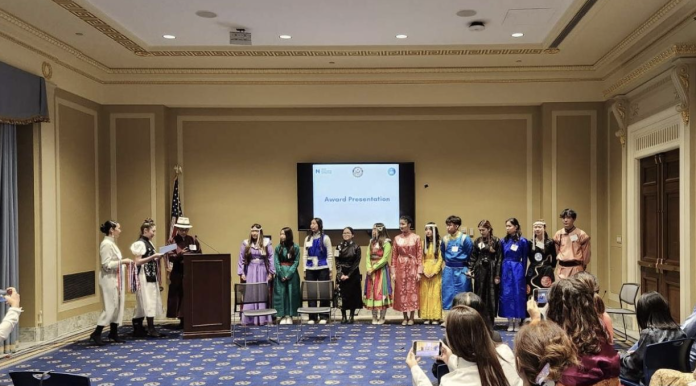Washington, DC – From the steppes of Mongolia to the heart of America, Mongolian culture has traversed continents, merging with diverse traditions while steadfastly preserving its unique heritage and cultural identity. Since 1990, the Mongolian diaspora in the United States has grown steadily, driven by the pursuit of opportunity in what many call “the land of dreams and opportunity.” This pursuit offered a chance for opportunities that did not exist in the homeland and a brighter future for themselves and their children.
Tenger Khuur Ensemble
The Tenger Khuur Ensemble is one of Mongolia’s ensembles originating in Chicago, Illinois. They are traditional performing arts groups dedicated to preserving and promoting Mongolian cultural heritage. Composed of two mentors and 11 children under 13, they are musicians who specialize in performing Mongolian music with the Morin Khuur, Tomor Khuur, and Yochin. The ensemble came from Chicago to perform at “The Second Congressional Mongolian New Year” as a cultural ambassador, sharing Mongolia’s rich traditions and music with audiences in the United States. Their performances capture the essence of Mongolian heritage and play a vital role in educating the Mongolian diaspora and American communities about Mongolian culture and music.

The ensemble performed timeless pieces like “Mongolian Melody” by N.Jantsannorov which was commissioned by the Mongolian National Radio, and “Jalam Khar” by E. Choidog. This piece captures the dark stallion’s majestic grace, with sweeping crescendos and lilting rhythms.
The ensemble has received a plethora of support from the Mongolian community. They felt encouraged and motivated to continue their work. Since recording support from the community, they made it their mission to promote Mongolian culture and music through their performances. “From the very beginning, the Mongolian-American community supported our ensemble with everything they had, helping us grow and thrive,” the ensemble said. “Now, as a well-established group, we are proud to give back by leading our community in promoting Mongolian culture and art, ensuring its legacy continues to flourish in the U.S. and beyond.”
New Neighbors Initiative (NNI)
 “The New Neighbor Initiative is a nonprofit organization, and our mission is to foster the development of minority communities by promoting cultural exchange, facilitating business partnerships, and creating opportunities for sustainable growth. We are dedicated to breaking down barriers, building bridges across cultures, and supporting inclusive initiatives that empower individuals and drive positive social and economic impact,” said organizer Urga Azat, CEO of the New Neighbor Initiative. “The New Neighbors Initiative envisions its future as the leading global advocacy, capacity-building, and cultural organization that governments, civil society, and private sector stakeholders turn to for development, consensus-building, and impact. NNI will serve as a bridge between diverse communities, fostering social cohesion, economic empowerment, and policy innovation,” said Azat.
“The New Neighbor Initiative is a nonprofit organization, and our mission is to foster the development of minority communities by promoting cultural exchange, facilitating business partnerships, and creating opportunities for sustainable growth. We are dedicated to breaking down barriers, building bridges across cultures, and supporting inclusive initiatives that empower individuals and drive positive social and economic impact,” said organizer Urga Azat, CEO of the New Neighbor Initiative. “The New Neighbors Initiative envisions its future as the leading global advocacy, capacity-building, and cultural organization that governments, civil society, and private sector stakeholders turn to for development, consensus-building, and impact. NNI will serve as a bridge between diverse communities, fostering social cohesion, economic empowerment, and policy innovation,” said Azat.
The New Neighbor Initiative hosted an event within Congress at the Rayburn building, where they invited the Tenger Khuur ensemble to perform and asked guest speakers, Uyema Gantulag—a Mongolian Aerospace research and Science Associate, Judith Teruya—the executive director of the Congressional Asian Pacific American Caucus (CAPAC), and panel speakers Angana Benerji—the Deputy Chief of the Asian Pacific Department at the International Monetary Fund, and Jamie Ramadan—the Senior County Program Coordinator of the World Bank Group.

NNI has hosted similar events—such as the Third Neighbor initiative in Congress last year, which featured a congressional briefing on the Mongolia Third Neighbor Trade Act that strengthened ties between the two nations. This time, what makes “The Second Congressional Mongolian New Year” special is that it was organized and planned by The Mongolian Student Union, which consists of aspiring college and high schoolers entirely, under the guidance of Temuulen Jargalsaikhan, a Project manager at Capital One. Many of the student organizers had the opportunity to plan such a significant event and develop valuable leadership and organization skills while deepening their understanding and knowledge of their own cultural heritage. This youth-driven approach shines light on the next generation of Mongolian Americans. It highlights the role that the next generation plays in shaping international relations and promoting their culture and heritage. “It was powerful to see the Mongolian-American community come together in a space where our voices are still emerging and often underrepresented. This celebration wasn’t just about tradition. It was about visibility. It sent a clear message to decision-makers that our community is vibrant, engaged, and here to stay. I hope this is just the beginning. Events like this not only honor our roots but also lay the groundwork for deeper cultural engagement, greater youth involvement, and long-overdue political recognition for Mongolian-Americans.” said Khulan Erdenebayar, Senior at Yale University and External Affairs Officer of Second Congressional Mongolian Lunar New Year Event.
“It was a great learning opportunity and provided many useful skills! It was also interesting to see the Mongolian culture come to life and help teach others,” said Emma Ariunbayasgalan, General Manager of the Second Congressional Mongolian Lunar New Year event and Senior at the Washington-Liberty High School.
Significance
Dee Dee Yang, the Public Affairs Liaison at National Ace, offered this perspective on the event: “I think events like these, especially on Capitol Hill, no less, is a really good way to share the culture and bringing in members of your community who can speak on industries relevant to Mongolia’s position in the global arena is nothing short of remarkable.” Her remarks on the event show the significance of hosting such initiatives on Capitol Hill, where the impact of cultural events can have a significant global impact. Spreading Mongolian culture to Congress members targets the policymakers of the United States, furthermore benefiting policy and political stability between the nations.
Recently, in 2023, the diaspora population of Mongolians has been increasing in the United States, which shows people have been traveling to the United States from Mongolia. A new policy that allows direct flights from Mongolia to the United States was introduced and passed. Improvements in the foreign relations foresight a better future for Mongolia and the United States. If both nations continue to work together and develop better relations, Mongolia could act as a neutral ground between political powerhouses Russia, China, and the United States, being located geographically between China and Russia. NNI’s efforts to host events improving and strengthening policies would effectively have a profound impact on future relations.
Amar Tuvshintugs
Amar Tuvshintugs is a writer based in Arlington, VA, specializing in culture, international affairs, and community engagement. With a focus on diverse perspectives, diplomacy, and policy, Amar explores the intersections of cultural exchange and global relations.





